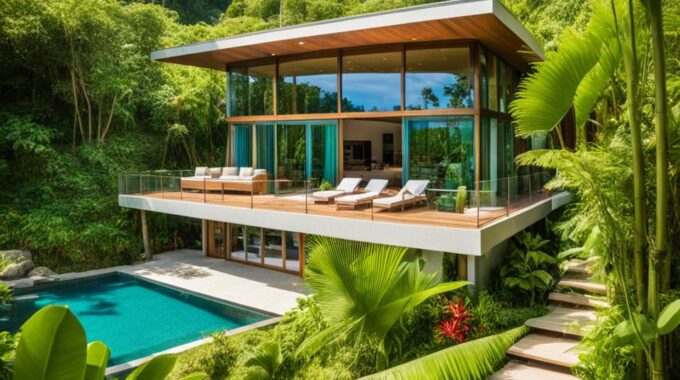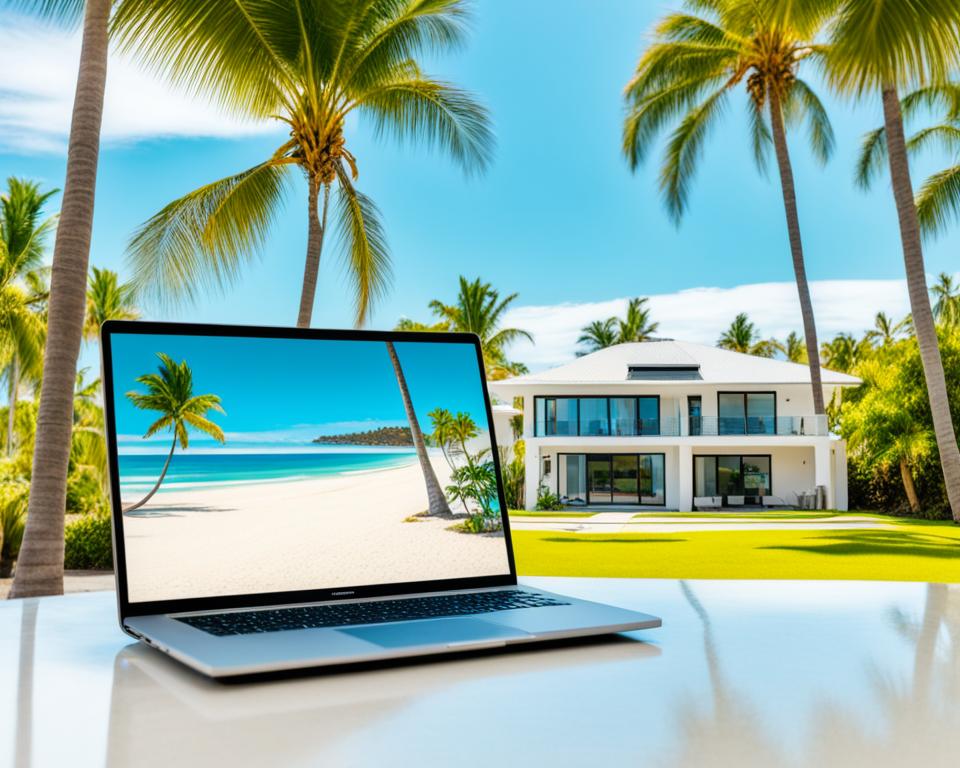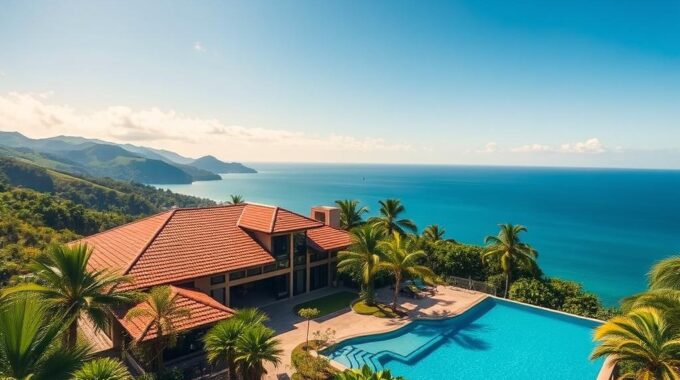In Costa Rica, property owners are increasingly leveraging their assets to secure equity loans, unlocking…

Get a Property Loan in Costa Rica: Our Comprehensive Guide With Gapequityloans.com
Getting a property loan in Costa Rica might feel overwhelming, especially for those from other countries. But don’t worry. We’re here to help you find the right loan to buy your dream home or investment property. GAP Equity Loans is a top choice for financing in Costa Rica. Their loans start at $50,000. You’ll find rates between 12% to 16%. These rates depend on the amount of your loan and the length of time you’ll repay it, from 6 months to 3 years.
Key Takeaways
- GAP Equity Loans offers loans in Costa Rica from $50,000, with rates between 12% to 16%.
- They have flexible loan terms, from 6 months to 3 years, to fit different project schedules.
- Foreigners receive special help from GAP Equity Loans to understand the Costa Rican market and get a loan.
- Costa Rican private lenders have short-term loans, like bridge loans, great for fast investment chances.
- They might offer loans up to 50% of a property’s value, making financing easier.
Introduction to Real Estate Financing in Costa Rica
To buy property in Costa Rica, you need to learn about mortgage options. This info helps locals and expats find a home or make an investment. Yet, it’s tough for foreigners to get a mortgage here. Local banks struggle to confirm where they live, work, and their financial history. The language barrier makes it even more difficult.
Challenges of Financing as a Foreigner
Understanding the various funding choices is key for anyone wanting to buy property in Costa Rica. From bank loans to private or seller financing, the options vary in needs, terms, and what they mean for you. This knowledge helps buyers make smart choices and go through the home-buying process easier.
Importance of Understanding Financing Options
Costa Rica’s real estate offerings fit many different budgets and lifestyle wants. Prices change a lot based on where the property is, its features, and its tourist draw. Places like Guanacaste or Jaco have high-priced homes because they’re so sought after. But, condos and townhouses offer more budget-friendly options.
How much the area is growing and its tourist market also affects home prices.
Costa Rica’s Real Estate Market Overview
Costa Rica is great for buying property, offering chances for both locals and foreign buyers. By understanding how financing works and with the help of pros, buying a home here becomes more doable.
Conventional Mortgage Options in Costa Rica
In Costa Rica, homebuyers can choose from various mortgage types. Fixed-rate mortgages keep the interest rate the same all through the loan. This is good for people who like knowing what they will pay every month. To get a fixed-rate mortgage in Costa Rica, you must show you have a stable income and a high credit score. You’ll also need to put down 20% to 30% of the home’s price.
Fixed-Rate Mortgages
The adjustable-rate mortgage is another choice in Costa Rica. Its interest rate changes and is often tied to the Prime Rate. This kind of mortgage might lower your costs in the beginning, if rates are low. But if rates go up, so do your monthly payments.
Adjustable-Rate Mortgages
Costa Rica has mortgages backed by the government for homebuyers. These loans need smaller down payments and offer better interest rates. They are perfect for buyers who might not get a loan from a traditional bank.
Government-Backed Mortgages
Knowing about fixed-rate, adjustable-rate, and government-backed mortgages helps buyers. They can then choose the best mortgage for their situation.

Alternative Financing Solutions
Costa Rica has different ways to help people buy homes beyond regular mortgages. Home equity loans, or second mortgages, let people use their home’s value from their own country. This is great for those moving to Costa Rica or investors finding it hard to get local loans.
Interest-Only Loans
Interest-only loans are a unique option in Costa Rica. At first, you only pay the loan’s interest. This keeps your initial costs lower, making it easier to buy a house. They are good for people with changing incomes or who plan to sell the house soon.
Seller Financing
In Costa Rica, you can also get a loan directly from the seller. The seller becomes the lender. They might ask for a big down payment (40-50%) and payment in 1-3 years. Seller loans have rates between 5-7%, helping those who can’t get bank loans.

How do I get a Property Loan in Costa Rica? The Process
Getting a mortgage in Costa Rica means gathering lots of documents. These include the purchase agreement for the property, your income proof, ID, Social Security data, and bank info. It’s key to have all documents ready and in order for your loan request.
Documentation Checklist
Here’s a list of documents you’ll need for a property loan in Costa Rica:
- Property purchase agreement
- Proof of income (e.g., pay stubs, tax returns)
- Personal identification documents (e.g., passport, ID card)
- Social Security information
- Bank statements
Role of Mortgage Brokers and Real Estate Agents
Choosing to work with expert mortgage brokers or reputable real estate agents makes life easier. They know the local scene well and can lead you through from start to closing. This help is for locals and foreign nationals alike.
Mortgage Rates and Costs
In Costa Rica, mortgage rates shift due to many financial reasons. The average mortgage rate from 2001 to 2023 was 14.04%. It typically varies between 6.11% and 26.28%. Foreigners may get loans at 8.5% to 10% from private banks. Private lenders might offer rates from 8% to 16%. Besides the interest, there are fees like setup, appraisal, and legal costs you need to account for.
| Financing Option | Loan-to-Value (LTV) Ratio | Interest Rates | Loan Terms |
|---|---|---|---|
| Private Banks | 30% to 50% down payment | 8.5% to 10% | Up to 20 years |
| Private Lenders | Up to 70% of property value or cost | 8% to 16% | Up to 15 years |
| Seller Financing | Over 50% down payment | 6% to 9% | 1 to 3 years |
To make your loan process smoother, know what documents you need. Also consider using experts’ advice and look at different finance options. This will help you face getting a property loan in Costa Rica with more confidence.

Real Estate Investment Considerations
Costa Rica’s real estate market attracts many global buyers. Thanks to private financing options, it’s easier for those with limited cash to join in. Various financing methods, such as private and short-term deals, keep the market’s value steady over time.
Seller Financing Benefits
In Costa Rica, seller financing helps both buyers and sellers. Sellers find that offering flexible terms speeds up their property’s sale. This draws in more potential buyers, making the market’s investment value stronger and more vibrant.
Long-Term Viability
The diverse financing landscape in Costa Rica includes traditional loans and private options. This makes property investment accessible for both locals and foreigners. With the right advice, buyers can make lasting returns from investing in Costa Rican real estate.
Conclusion
Getting a property loan in Costa Rica is full of chances for both locals and foreigners. You can choose a traditional mortgage, an equity loan, or other ways to finance your home. Working with trusted companies like GAP Equity Loans and knowing the local market helps buyers feel secure.
There are many ways to finance a property here, from private loans to help from builders. Even if you have little cash, these options let you get into Costa Rica’s real estate scene. The constant demand and available funding keep properties attractive for investment.
For locals or foreign investors, Costa Rica offers a variety of ways to buy property. Exploring different finance options with the help of experts can lead to smart investments. This approach can help take advantage of Costa Rica’s real estate as a strong investment over time.
FAQ
What are the different mortgage options available for purchasing property in Costa Rica?
In Costa Rica, you can find fixed-rate and adjustable-rate mortgages. There are also government-backed options. Buyers might also check out home equity loans, interest-only loans, and seller financing.
What are the challenges of obtaining a mortgage as a foreigner in Costa Rica?
Getting a mortgage in Costa Rica might be tough for foreigners. Local banks may find it hard to check your background. This includes where you live, work, and your financial history. The language barrier makes things even more complex.
How does the Costa Rican real estate market influence property financing options?
Costa Rica’s active real estate market has many financing choices for property. This includes private and creative short-term options. It’s designed to help buyers without a lot of cash break into the market.
What documentation is required to obtain a property loan in Costa Rica?
Getting a mortgage in Costa Rica means you’ll need a lot of documents. These include the property’s purchase agreement, your income proof, and personal ID. You’ll also need your Social Security details, bank statements, and more. It’s very important to have all these documents ready.
How can working with mortgage brokers and real estate agents help in the property loan process in Costa Rica?
Experienced mortgage brokers and real estate agents can make getting a loan easier in Costa Rica. They know the local market well. They can help with everything from paperwork to finding the best loan options.
What are the typical mortgage interest rates and associated costs in Costa Rica?
Mortgage interest rates in Costa Rica change based on the economy. For foreigners, rates usually range from 8.5% to 16%. Besides the interest, there are other costs like loan fees, property appraisal, legal fees, and closing costs.
How does seller financing benefit both buyers and sellers in the Costa Rican real estate market?
Seller financing in Costa Rica is good for both sellers and buyers. Sellers can offer more flexible payment plans. This can make their property sell faster and to more buyers. It helps open up the market, making Costa Rican real estate a better investment.
Source Links
- https://www.gapequityloans.com/en/ways-to-finance-a-house-in-costa-rica/
- https://www.gapequityloans.com/en/loan-financing-in-costa-rica/
- https://www.prestige-ocean-properties.com/property-financing-costa-rica
- https://bluewaterpropertiesofcostarica.com/blog/costa-rica-real-estate-financing-4-options/
- https://gapinvestments.com/en/real-estate-development-loans-in-costa-rica/
- https://www.remax-oceansurf-cr.com/financing-for-foreigners-in-costa-rica
- https://www.tresamigos-cr.com/financing-property-costa-rica
- https://osatropicalproperties.com/blog/real-estate-financing-in-costa-rica-can-you-get-a-mortgage-for-a-home-in-costa-rica
- https://gapinvestments.com/en/secure-loans-in-costa-rica/
- https://www.gapequityloans.com/en/costa-rica-home-equity-loans/
- https://www.gapequityloans.com/en/costa-rica-home-equity-loans-guide/
- https://www.gapequityloans.com/en/commercial-loans/
- https://www.gapequityloans.com/en/construction-loans/
- https://www.gapequityloans.com/en/loan-application-costa-rica/
- https://www.specialplacesofcostarica.com/blog/how-to-get-a-mortgage-in-costa-rica/
- https://www.gapequityloans.com/en/equity-loans-faq/
- https://crlaw.info/info/real-estate/mortgages/mortgages-and-financing-in-costa-rica/
- https://gapinvestments.com/en/how-does-investment-property-financing-work-in-costa-rica/
- https://crie.cr/financing-property-in-costa-rica/


